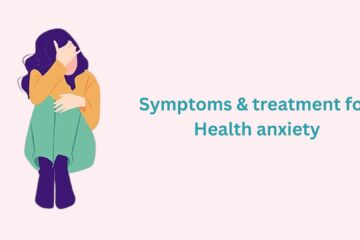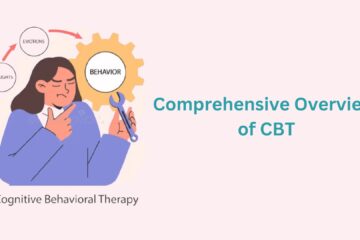Depression is a complex mental health condition that affects millions of people worldwide. It goes beyond just feeling sad and can have a profound impact on a person’s daily life. This article aims to provide a comprehensive understanding of depression, its symptoms, and causes. We will also explore various treatment options available, shedding light on the importance of seeking professional help. Whether you’re seeking information for yourself or a loved one, this guide will offer valuable insights into the world of depression.
What Is Depression?
Depression is a mental health disorder characterized by persistent feelings of sadness, loss of interest or pleasure in activities, changes in appetite or weight, difficulty sleeping or sleeping too much, fatigue, feelings of worthlessness or guilt, difficulty thinking or concentrating, and thoughts of death or suicide. It is more than just feeling sad or going through a rough patch in life; it is a serious condition that affects a person’s thoughts, feelings, and overall well-being. Depression can interfere with daily functioning and can lead to a variety of emotional and physical problems. It is important to seek professional help if experiencing symptoms of depression
Symptoms of Depression
1. Sadness
A persistent feeling of sadness or a depressed mood that lasts for an extended period of time.
2. Worthlessness:
A belief or feeling of being inadequate, useless, or lacking value, often accompanied by low self-esteem.
3. Irritability:
heightened sensitivity or tendency to become easily annoyed, frustrated, or agitated.
4. Fatigue:
An overwhelming sense of tiredness, exhaustion, or lack of energy that persists despite adequate rest or sleep.
5. Guilt:
Persistent feelings of guilt, self-blame, or remorse, often over past events or perceived shortcomings.
6. Anxiety:
Excessive worrying, restlessness, or a sense of impending doom or fear that can accompany depression.
7. Restlessness:
Feeling unable to sit still or a constant need to move, often accompanied by inner tension or unease.
8. Lack of concentration:
Difficulty focusing, making decisions, or remembering things, often leading to decreased productivity and performance.
9. Sleep problems:
Insomnia (difficulty falling asleep, staying asleep, or early morning awakening) or hypersomnia (excessive sleepiness or prolonged sleep).
10. Overeating or loss of appetite:
Significant changes in appetite, leading to weight gain or weight loss.
11. Physical pain:
Unexplained or persistent physical symptoms such as headaches, stomachaches, backaches, or muscle aches, without a clear medical cause.
It’s important to note that experiencing one or a few of these symptoms does not necessarily indicate depression, but if someone consistently experiences several of these symptoms for at least two weeks or more, it may be indicative of depression, and seeking professional help is advisable.
Causes of Depression
1. Biological Factors:
Depression can be caused by certain biological factors in our bodies. Sometimes, our brain chemicals called neurotransmitters don’t work properly, which can affect our moods and emotions. This imbalance of chemicals can make us more prone to experiencing depression.
2. Genetics:
Another cause of depression can be related to our genes, which are like tiny instructions inside our bodies that we inherit from our parents. If someone in our family, like a parent or sibling, has experienced depression, we might be more likely to develop it too. This doesn’t mean we will definitely have depression, but it increases the chances.
3. Life Events:
Certain events or situations in our lives can trigger depression. For example, going through a difficult breakup, losing a loved one, or facing financial problems can make us feel sad and hopeless. These challenging life events can sometimes lead to depression, as they can be overwhelming and affect our mental well-being.
4. Social Factors:
The people around us and our social environment can also play a role in causing depression. If we face constant bullying, feel isolated, or lack a strong support system, it can make us more vulnerable to developing depression. Our relationships and the way we interact with others greatly impact our mental health.
5. Chronic Illness or Pain:
Dealing with a long-term illness or experiencing chronic pain can contribute to depression. When our bodies are constantly in discomfort or we are struggling with a serious health condition, it can take a toll on our mental well-being and lead to feelings of sadness and hopelessness.
6. Substance Abuse:
The use of drugs or alcohol can worsen or even cause depression. While some people might turn to substances as a way to cope with their feelings, they end up worsening their mental state. Substance abuse can disrupt the balance of chemicals in our brains and make us more susceptible to developing depression.
7. Hormonal Changes:
Hormones are special chemicals in our bodies that help regulate various functions. Fluctuations in hormone levels, such as during pregnancy, postpartum period, or menopause, can contribute to the development of depression. These hormonal changes can affect our emotions and make us more prone to experiencing depressive symptoms.
8. Low Self-esteem:
Having low self-esteem, or not feeling good about oneself, can also be a cause of depression. When we constantly criticize ourselves, compare ourselves to others, or feel like we’re not worthy, it can lead to feelings of sadness, worthlessness, and eventually depression.
Remember, depression is a complex condition, and often multiple factors can contribute to its development. It’s important to seek professional help if you or someone you know is experiencing symptoms of depression, as there are effective treatments available.
Treatment Of Depression
1. Medication-based treatment:
This heading refers to the use of prescribed medications, such as antidepressants, to manage and alleviate the symptoms of depression. Medication-based treatment aims to balance certain chemicals in the brain, such as serotonin, that may be imbalanced in individuals with depression. It is typically recommended for moderate to severe cases of depression or when other forms of treatment have proven ineffective.
Psychotherapy or talk therapy:
This heading encompasses various forms of therapy, such as cognitive-behavioral therapy (CBT), psychodynamic therapy, and interpersonal therapy. Psychotherapy involves a trained therapist helping individuals with depression identify and address negative thoughts, behaviors, and emotions associated with their condition. It aims to promote healthier coping mechanisms, develop problem-solving skills, and improve overall mental well-being.
3. Lifestyle changes and self-care:
This heading emphasizes the importance of making positive changes in one’s lifestyle to manage and reduce symptoms of depression. It may include adopting a healthier diet, engaging in regular exercise, improving sleep hygiene, practicing stress reduction techniques (e.g., meditation or yoga), and setting realistic goals. Self-care involves prioritizing activities and practices that promote emotional well-being and provide individuals with a sense of fulfillment and enjoyment.
4. Support groups and peer support:
This heading highlights the benefits of joining support groups or seeking peer support for individuals with depression. Support groups can provide a safe and understanding environment where individuals can share their experiences, learn from others, and receive emotional support. Peer support involves connecting with others who have experienced depression, providing empathy, encouragement, and practical advice.
5. Alternative treatments:
This heading refers to non-traditional approaches that some individuals may explore alongside or instead of conventional treatments. It may include techniques such as acupuncture, herbal supplements, mindfulness practices, or other complementary therapies. While alternative treatments may offer some relief for certain individuals, it is important to consult a healthcare professional before incorporating them into a depression treatment plan.
It is crucial to note that the effectiveness of each treatment option may vary from person to person, and a combination of treatments is often recommended for the best outcomes. Consulting with a healthcare professional or mental health provider is essential to determine the most appropriate and effective treatment approach for an individual’s specific needs and circumstances.
Natural remedies and lifestyle tips
1. Exercise for Mood Enhancement:
Regular physical activity, such as jogging, swimming, or yoga, can help improve mood and reduce symptoms of depression and anxiety. Exercise releases endorphins, which are natural mood boosters, and also promotes better sleep and overall well-being.
2. Avoidance of Alcohol and Substances:
Alcohol and certain substances, like recreational drugs or excess caffeine, can negatively impact mental health. They can disrupt sleep patterns, worsen mood disorders, and interfere with medication effectiveness. It is important to limit or avoid these substances to maintain good mental health.
3. Setting Healthy Limits:
Establishing boundaries and saying no when necessary can help reduce stress and prevent burnout. Learning to prioritize and manage time effectively can also improve overall well-being and prevent feelings of overwhelm.
4. Self-Care Practices:
Engaging in self-care activities, such as taking relaxing baths, practicing mindfulness or meditation, spending time in nature, or doing hobbies, can significantly improve mental health. These activities help reduce stress, promote relaxation, and provide a sense of enjoyment and fulfillment.
5. Alternative Treatments:
Some individuals find relief from mental health symptoms through alternative treatments like acupuncture, massage therapy, or herbal remedies. While the effectiveness of these treatments may vary, they can be beneficial for certain individuals when used alongside conventional therapies.
6. Supplements for Consideration:
Certain supplements, like omega-3 fatty acids, St. John’s Wort, or SAMe, have been studied for their potential benefits in improving mental health. However, it is essential to consult with a healthcare professional before starting any supplements, as they may interact with medications or have side effects.
7. Vitamins and Their Impact:
Adequate intake of vitamins, such as vitamin D, B vitamins, and magnesium, is important for maintaining good mental health. Deficiencies in these vitamins have been associated with increased risk of depression and anxiety. Eating a balanced diet or considering vitamin supplements can help ensure sufficient vitamin intake.
8. Caution with Supplements:
While supplements can be helpful, it is important to use them cautiously and under the guidance of a healthcare professional. Some supplements may have interactions with medications, cause allergic reactions, or have adverse effects when taken in excessive amounts. Always follow recommended dosages and consult a healthcare professional before starting any new supplement.
Impact Of Depression On Daily Life
1. Decreased motivation and productivity:
Depression can significantly affect a person’s motivation and ability to engage in activities they once enjoyed. This can lead to a decrease in productivity at work or school, making it difficult to complete tasks or meet responsibilities.
2. Social withdrawal and isolation:
Depression often causes individuals to withdraw from social activities and isolate themselves from friends, family, and social gatherings. They may feel a lack of interest or energy to engage with others, leading to a sense of loneliness and further exacerbating their depressive symptoms.
3. Impaired physical health:
Depression can negatively impact physical health. Individuals with depression may experience fatigue, aches, and pains, and have a compromised immune system, making them more susceptible to illnesses.
4. Disrupted sleep patterns:
Depression often disrupts a person’s sleep patterns, leading to insomnia or excessive sleepiness. This can result in a constant feeling of tiredness, difficulty concentrating, and a further decline in overall well-being.
5. Negative impact on relationships:
Depression can strain relationships as individuals may struggle to engage emotionally or provide support to their loved ones. They may withdraw, become irritable, or have difficulty expressing their feelings, leading to conflicts and strained connections.
6. Financial struggles:
Depression can lead to difficulties in maintaining employment or managing finances. The lack of motivation, decreased productivity, and impaired focus can make it challenging to hold a job, resulting in financial instability and added stress.
7. Changes in appetite and weight:
Depression may cause changes in appetite, resulting in loss of interest in food or emotional eating. This can lead to weight loss or weight gain, further affecting an individual’s self-esteem and overall health.
8. Reduced self-esteem and self-worth:
Depression often leads to feelings of self-doubt, worthlessness, and low self-esteem. Individuals may have negative thoughts about themselves, their abilities, and their value, which can impact their overall sense of self-worth.
9. Difficulties in decision-making and problem-solving:
Depression can make it challenging to make decisions or solve problems effectively. Individuals may struggle with concentration, memory, and finding motivation, resulting in difficulty in making choices or finding solutions to everyday challenges.
10. Increased risk of substance abuse:
Depression can increase the risk of turning to substances, such as drugs or alcohol, as a way to cope with emotional pain. Substance abuse further exacerbates the negative effects of depression and can lead to additional health and relationship problems.
Conclusion
In conclusion, depression is a complex mental health condition that affects millions of people worldwide. It is characterized by persistent feelings of sadness, loss of interest, and a range of physical and emotional symptoms. The causes of depression are multifaceted, involving genetic, biological, environmental, and psychological factors. However, there are effective treatment options available, including therapy, medication, and lifestyle changes. It is important to seek help and support if you or someone you know is experiencing symptoms of depression, as early intervention can greatly improve outcomes.




